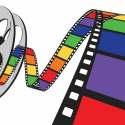Pariah (2011)
Art and drama meet in this film written and directed by Dee Rees, open lesbian and certified bad-ass. Claiming the film to be semi-autobiographical, Pariah follows Alike through her slow but tremendous process of coming to terms with her queerness. We see first love, first realization, and first moments of vulnerability come to life on screen as Alike falls for Bina. But of course, what is a coming-out story without a little familial tension? Throughout Alike’s process of coming to terms with her lesbian identity and masculine appearance, her family struggles with the transformation of their loved one. If we’re being honest, the tumultuous family responses are a little hard to watch. But the acceptance that Alike has for herself in the end makes up for it. This film reflects how badly we all just want to be free.
4th Man Out (2016)
Not all coming-out stories are tragic, as much as Hollywood would love to have you believe that. This movie is a story about a bro coming out to his bros, and his bros worrying whether everyone can or will remain bros. Shocker: they do, but not without some struggles. The story highlights the ignorance and casual homophobia of Adam’s three (presumably straight) best friends, and how the dynamics of their group friendship suddenly shift after Adam’s hilarious and awkward coming out. In short, it isn’t so much about Adam’s gayness as much as it is about friendships and how his friends are willing to learn and grow as people along side him. It is a lighthearted, a bit cheesy, but overall a decent alternative to the all too common depressed, tormented, outcasted gay man trope.
3 Generations (2015)
In this film, “Ramona” reveals to his family, which consists of his mother, his openly lesbian grandmother, and his grandmother’s partner, that he is ready to begin transitioning into Ray. The four live together, and not everyone sees Ray’s transition positively. This is an important aspect to the film, as the family member who is most against Ray’s transition is his grandmother, illustrating that in the LGBTQ+ community there is internal prejudice. However, Ray’s mother supports him (to an extent). The issue is that Ray is only 16 and needs both parents to sign over their permission to his transition. So, the search for Ray’s father begins and Ray learns more about himself and his family than ever before. This film is equal parts humorous and tense; a comedy trapped inside a melodrama that will leave feeling angry, happy, and most confused. Ah, such is life.
Princess Cyd (2017)
To take a break from her not so great father, Cyd decides to visit her Aunt for the summer and soon finds herself infatuated with barista Katie. Although there is a queer sublot to the film, the focus is mainly on Cyd and her Aunt as they learn from each other through differences of opinion, religion, hobbies, and sexuality. What makes this film so great is how normalized Cyd’s sexuality is. There is no dramatic awakening, no traumatic coming-out process, and absolutely no shame. When Cyd casually mentions her crush to her Aunt, the brief conversation we get is a breath of fresh air. The nonchalant attitude that the characters have towards sexuality and gender is something more films should emulate.
The L Word (TV series)
Classic. The L Word is classic. Following the lives, loves, lusts, and lies of a group of queer folks in L.A. (mostly lesbian identified), this show gives you all the drama of any other show…minus the straight white people. Diversity is key to The L Word. There are Latinas, African-Americans, bisexuals, lesbians, transgender people, and the list goes on and on. At one point there is even a man who identifies as a man…and a lesbian. This show has it all, and it is set in a world where everyone is gay until proven straight. There’s something to love about each character (everyone except Jenny, that is) so your heart strings are constantly being pulled. There are 6 season worth of extensive sex scenes. You’re welcome.
Queer Eye (Netflix series)
Binge-watchable. Many readers will be familiar with the show Queer Eye for the Straight Guy which aired in the early 2000’s. Although this Netflix series is based off said show, it is not nearly as irritating, stereotypical, or cringy. There is also a focus on much larger issues than fashion. Netflix’s Queer Eye is about self-image, self-esteem, and self-respect. Viewers may be shocked to find that the show deals with a lot of social issues as well such as racism, sexism, and of course homophobia. There is a lesson to be learned in each episode that will have you rooting for The Fab 5 and the people they transform. Most of all, the show is fun. The Fab 5 are unapologetically themselves, and unashamed in their queerness. This series is a great one to pass the time, but be warned: things do get a little emotional.
